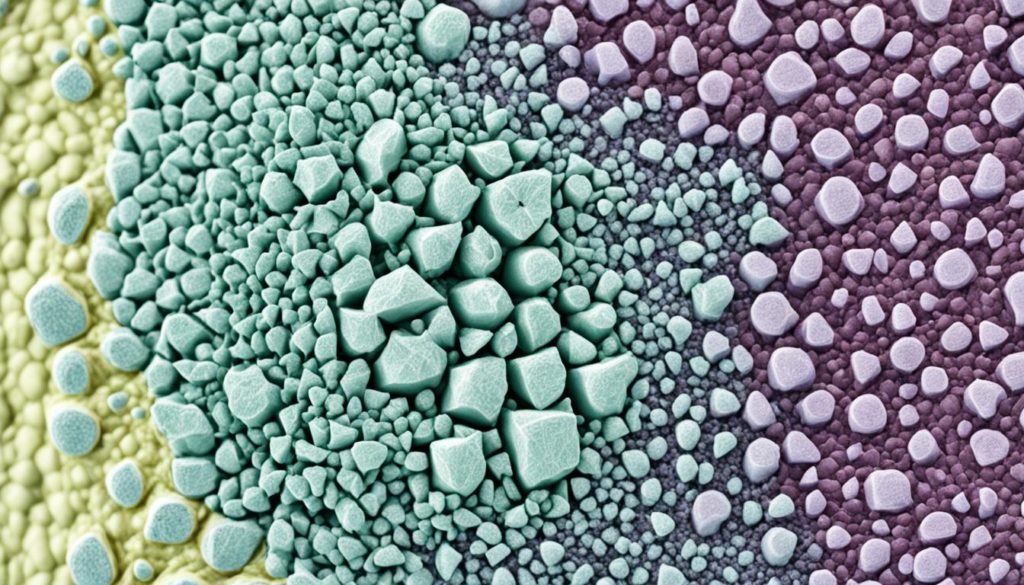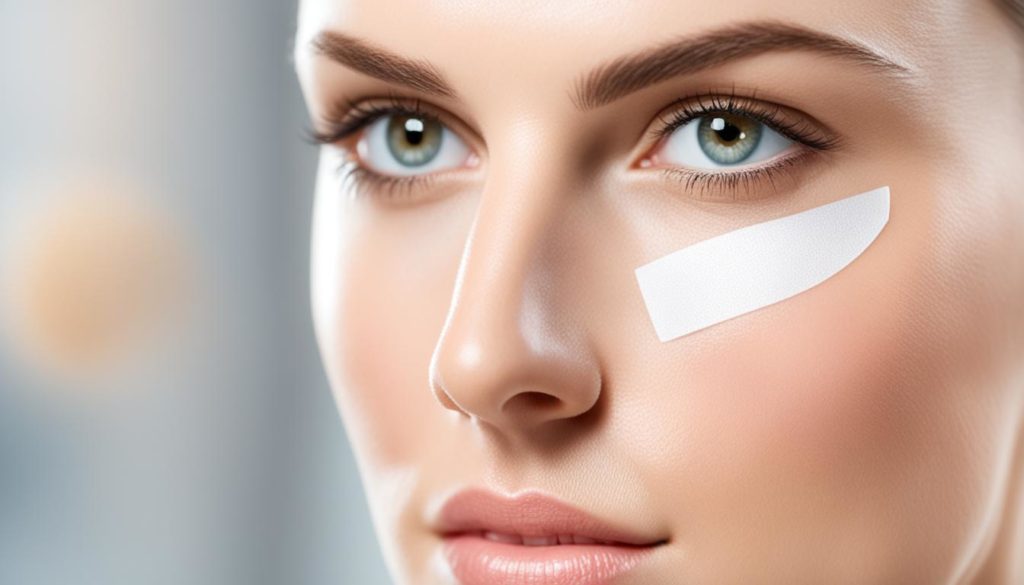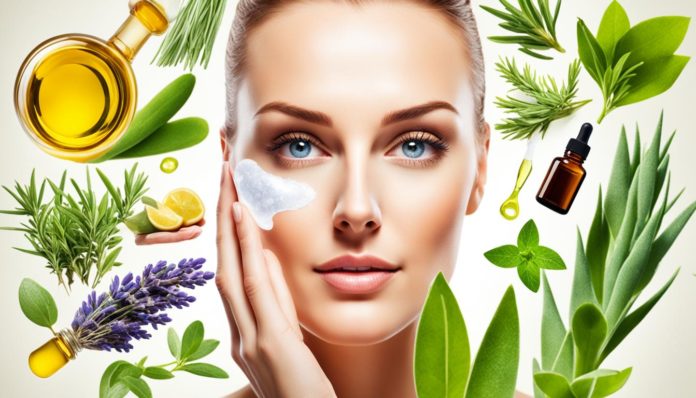Did you know more than 50 million Americans have acne every year? This makes it the most common skin condition in the United States.
Welcome to the Clear Skin Guide. This is where you find answers for beating acne, no matter if it’s just a few pimples or serious cystic acne. We look at many treatments, from well-known methods to new strategies, to help your skin. The information comes from respected sources, like the American Academy of Dermatology and studies in major medical journals.
We aim to help you get clear skin with effective acne control. You’ll find expert advice and stories of people who made it happen. Getting clear skin is possible when you follow the right steps.
Key Takeaways
- Over 50 million Americans suffer from acne each year.
- The Clear Skin Guide offers advanced acne treatments and individualized care plans.
- Sources include trusted organizations such as the American Academy of Dermatology and the National Institutes of Health.
- Exploring both conventional and innovative therapies can help you achieve clear skin.
Understanding Acne: Causes and Types
Acne is a skin problem faced by many around the globe. Knowing the causes of acne and the types helps in dealing with it. Hormonal changes, genetics, and environmental factors can cause breakouts.

Common Causes of Acne
Research by the National Institutes of Health points out key factors leading to acne. These include:
- Hormonal Changes: Hormone shifts during puberty, menstruation, and pregnancy may increase oil and clog pores.
- Genetics: If your family has a history of acne, you might be more prone to it.
- Environmental Triggers: Things like pollution, humidity, and certain skincare items can cause acne.
Different Types of Acne
The American Academy of Dermatology describes many acne types, each needing its own treatment plan. It’s vital to understand these types for better acne control.
| Type of Acne | Description | Treatment Approach |
|---|---|---|
| Blackheads | Open comedones with a dark surface | Topical retinoids and salicylic acid |
| Whiteheads | Closed comedones beneath the skin surface | Benzoyl peroxide and topical antibiotics |
| Cysts | Painful, pus-filled lumps under the skin | Oral antibiotics and isotretinoin |
| Nodules | Large, solid, painful lumps beneath the skin | Systemic treatments and steroid injections |
The British Journal of Dermatology and expert dermatologists stress personalized treatments. They say it’s key to focus on specific acne factors for best results.
Preventive Measures for Acne
To prevent acne, combine good skincare, wise food choices, and lifestyle changes. These steps come from skin experts. They help stop acne before it starts and keep your skin healthy.
Proper Skincare Routine
Keeping your skin clear starts with the right skincare. Use a gentle face wash to clean without removing natural oils. Pick products that won’t block your pores. It’s also smart to exfoliate softly and regularly, but don’t use rough scrubs. They can make things worse. Adding items with salicylic acid or benzoyl peroxide can fight bacteria and unblock pores. Don’t forget a light, oil-free moisturizer to keep your skin moist.

Talking to a skin doctor for advice is a good move. Sticking to this skincare plan will help your skin fight acne better.
Diet and Lifestyle Changes
Eating right is key for acne-free skin. Studies show eating less sugar and dairy can help. Foods with omega-3s, like fish and flaxseeds, and lots of fruits and vegetables are great too. Also, try to eat fewer foods that make your blood sugar jump.
For clear skin, manage stress with things like yoga or meditation, get enough sleep, and limit smoking and drinking. These steps take a full approach to stop acne.
Harvard Medical School experts say mixing a strict skincare routine with healthy eating is the best way to prevent acne and keep your skin at its best.
Over-the-Counter Acne Solutions
OTC Acne Solutions are handy and work well. You can find these products easily, and they help with light to medium acne. By learning about the different types and ingredients, you can pick the best one for your skin.
Topical Treatments
Topical treatments focus on certain skin areas. They come as creams, gels, and lotions. They have benzoyl peroxide and salicylic acid to fight acne.
Benzoyl peroxide fights bacteria that cause acne. Salicylic acid helps to unclog pores and lowers swelling.
Using these products as directed is key. Regular use can make your skin clearer and reduce acne. Looking at reviews and studies can show how well these products work.
Oral Medications
Oral treatments also help with acne. These pills, often with zinc, help reduce swelling and heal skin. Always talk to a doctor before starting any new pill to avoid problems with other medicines.
Reading reviews and looking at research can guide you to the best oral treatment. Knowing how both topical and oral treatments work together can lead to better skin.
| Product | Active Ingredient | Usage | Effectiveness |
|---|---|---|---|
| Benzoyl Peroxide Gel | Benzoyl Peroxide | Topical | High |
| Salicylic Acid Cream | Salicylic Acid | Topical | Moderate |
| Zinc Supplement | Zinc | Oral | Moderate |
Prescription Acne Treatments
Prescription acne treatments are crucial for those with moderate to severe acne. They help reduce breakouts and boost skin health. This part talks about Retinoid Therapy and Antibiotic Treatment, the main types of prescriptions.
Retinoids
Retinoids are a top choice by dermatologists. They come from Vitamin A and help skin renew itself, reduce swelling, and keep hair follicles clear. You can get them as creams or pills. Tretinoin, adapalene, and tazarotene are some you might know.
Retinoids are powerful but can dry out skin, cause peeling, and make you more sensitive to the sun. It’s important to listen to a doctor’s advice when using them. The Journal of Clinical and Aesthetic Dermatology talks about new retinoids that are less harsh but still work well.
Antibiotics
Antibiotics help fight the bacteria and swelling that acne can cause. Some are applied to the skin while others are taken by mouth. Topical ones like clindamycin and erythromycin work for lighter acne. Pills like doxycycline and minocycline tackle tougher cases.
The American Journal of Clinical Dermatology says it’s critical to use antibiotics carefully to avoid resistance. Dermatologists might mix them with other treatments to get better results and fewer side effects. Doctors say it’s best to make plans based on each person’s unique skin.
Here’s a closer look at the acne treatments we mentioned:
| Medication | Type | Common Uses | Potential Side Effects |
|---|---|---|---|
| Tretinoin | Topical Retinoid | Moderate to severe acne, anti-aging | Dryness, peeling, sun sensitivity |
| Adapalene | Topical Retinoid | Mild to moderate acne | Skin irritation, redness, dryness |
| Clindamycin | Topical Antibiotic | Mild to moderate acne | Skin dryness, itching |
| Doxycycline | Oral Antibiotic | Severe acne, inflammatory acne | Digestive issues, sun sensitivity |
Choosing the right acne medicine is important for control and improvement. Always talk to a dermatologist to identify the best options for your unique skin needs.
Natural and Home Remedies for Acne
Looking into natural and homemade acne solutions can be both beneficial and soft on the skin. It’s key to understand the potential upsides and downsides. This helps people make smart decisions about using these options in their skincare routine.
Essential Oils
Natural Remedies for Acne often include essential oils, which many people enjoy using. Tea tree oil, known for fighting bacteria, is a common choice. Lavender and rosemary oils also help by reducing inflammation and might help lessen acne.
Herbal Supplements
Herbal Acne Treatments offer another way to deal with acne. People often talk about zinc and omega-3 fish oil. These are said to lower inflammation and help the skin. But, it’s smart to talk to a doctor before trying new supplements.
DIY Masks and Treatments
Creating DIY Acne Solutions can be an affordable and enjoyable approach to skincare. Ingredients like honey, cinnamon, and green tea could help with acne. They also help keep the skin healthy. A well-liked DIY mask is made from honey and cinnamon for their germ-fighting and swelling-reducing effects.
For more tips on homemade remedies, you can check out a detailed article at Natural Remedies for Acne.
While these approaches can be effective, doing a patch test is vital to prevent bad reactions. Also, talking to a skin doctor can offer more personalized advice. Combining scientific understanding with home-based practices could lead to clearer and healthier skin.
Expert-Recommended Skincare for Acne
Choosing the right skincare products is key for those with acne-prone skin. Dermatologists recommend a regimen including Acne-Friendly Cleansers, Skin Toners, and Non-comedogenic Moisturizers. This helps manage and lessen breakouts. We’ll discuss how to pick the best products for your acne care routine.
Cleansers
Start with Dermatologist-Approved Skincare cleansers. These Acne-Friendly Cleansers contain active ingredients like salicylic acid or benzoyl peroxide. They unclog pores and lessen inflammation. A Cosmetic Dermatology study found these ingredients greatly reduce acne. Brands like Cetaphil and Neutrogena make gentle, effective products.
Toners
Adding Skin Toners to your routine can help with acne management. Toners balance your skin’s pH and remove remaining dirt after cleansing. Studies show toners with glycolic acid or witch hazel aid acne-prone skin. Brands like Pixi and Thayers offer great toners for controlling breakouts.
| Product | Active Ingredients | Benefits |
|---|---|---|
| Cetaphil Oily Skin Cleanser | Zinc, Glycerin | Reduces Oiliness |
| Neutrogena Oil-Free Acne Wash | Salicylic Acid | Unclogs Pores |
| Pixi Glow Tonic | Glycolic Acid | Exfoliates, Unifies Skin Tone |
| Thayers Witch Hazel Toner | Witch Hazel, Aloe Vera | Soothes and Balances |
Moisturizers
To finish our skincare advice, Non-comedogenic Moisturizers are vital. They hydrate without clogging pores, stopping new breakouts. Dermatologists suggest CeraVe’s Daily Moisturizing Lotion and La Roche-Posay’s Effaclar Mat. These keep your skin matte and balanced.
Innovative Acne Therapy Methods
Innovative acne treatments are changing skincare by targeting acne effectively. Advanced Acne Therapy has made great strides in dermatology. Techniques like Laser Skin Treatment and Blue Light for Acne show promising results. They’re reducing acne severity and making skin healthier.
Laser Treatments
Laser Skin Treatment is key in fighting acne. It uses light to lessen inflammation and battle bacteria. Studies show this method can decrease acne and prevent new breakouts.
This treatment also boosts collagen, helping the skin rejuvenate. Dermacare Laser & Skin Care Clinics have seen patients’ skin texture improve and acne scars lessen after several treatments. But, there might be temporary redness and swelling. For more info, check out the detailed evaluation.
Blue Light Therapy
Blue Light for Acne is a popular, non-invasive option. It uses blue light to kill the bacteria causing acne. The skin isn’t harmed, and it fights inflammation effectively.
Research finds Blue Light Therapy can cut acne by 50% after a few sessions. Laser treatment experts see it as a big step in acne treatment. Patients are also really happy, noticing clearer skin and using fewer meds. Side effects can include dryness or skin color changes.
These new methods show a move towards better acne treatments. They give quick relief and help with long-term skin health. By using these advanced treatments, people can get clearer, healthier skin with fewer issues. To know more about these treatments, studies and patient stories offer in-depth insights.
Best Acne Treatment for Severe Cases
People facing persistent, severe acne need more than basic care. They must look at advanced treatment options. These options include medical treatments and advice from Acne Specialists.
Isotretinoin, also known as Accutane, is a top choice for tough acne cases. It works by making oil glands smaller and less oily. The American Academy of Dermatology says it’s very effective but must be used with caution due to side effects.
Hormonal therapies are key in treating Adult Acne. Options like birth control pills and anti-androgens help balance hormones that cause acne. These are often suggested for women with acne due to hormonal changes.
Working with Acne Specialists means getting care that’s right for you. They do detailed checks to find the best acne treatment for each person. Specialists are crucial for getting the best results, as research and expert opinions show.
| Treatment | Effectiveness | Side Effects | Recommended For |
|---|---|---|---|
| Isotretinoin | High | Dry skin, liver enzyme changes | Severe, cystic acne |
| Hormonal Therapies | Moderate to High | Nausea, weight gain | Hormone-related acne |
| Specialist-guided treatments | Varies | Specific to treatment | Complex cases |
Seeing real improvement in patients proves these acne treatments work. Teaming up with Acne Specialists and following a personalized plan can really help. It’s a hopeful option for those battling severe acne.
Conclusion
Understanding different acne solutions is key for clear, healthy skin. This guide has shown many treatment options. It stresses that personalized plans work best. These plans can include skincare routines, diet changes, and many treatments. Now, readers can choose options that fit their skin best.
Acne therapy has improved with methods like laser and blue light therapy. These new treatments are based on solid science. They have helped many find better skin health. Surveys from dermatology show the real benefits of these modern methods.
Dermatologists and skin experts offer hope to those fighting acne. With the right skincare, treatments, and determination, clearer skin is possible. It’s important to keep trying and learn as much as you can. By doing this, you can move towards healthier skin. Celebrate every step forward in this journey.
FAQ
What are the most effective acne treatments?
The best acne treatments depend on the person. Mild acne often improves with benzoyl peroxide or salicylic acid. For tougher cases, doctors might suggest retinoids or antibiotics. Severe acne may need laser therapy, blue light treatments, or isotretinoin. It’s essential to see a dermatologist for a personal plan.
What causes acne?
Acne comes from several factors such as hormonal changes, genetics, and the environment. Problems like too much oil, blocked hair follicles, bacteria, and swelling also play a role. Knowing these factors helps choose the right treatment and prevention.
How can I prevent acne?
To prevent acne, use skincare that suits acne-prone skin. This means using gentle, non-comedogenic products and cleansing twice a day without harsh scrubs. Eating less dairy and sugar and reducing stress can also make a big difference.
What over-the-counter acne solutions are available?
You can find many treatments at the store, like benzoyl peroxide, salicylic acid, and glycolic acid. There are also sulfur products, retinoid creams such as adapalene, and supplements like zinc and probiotics. Always read the instructions and check with a healthcare provider if needed.
What prescription acne treatments are there?
Doctors may prescribe topical retinoids, antibiotics, or combined treatments for acne. Severe acne might require oral retinoids, hormonal treatments, or corticosteroid injections. A dermatologist can recommend the best option.
Are there natural and home remedies for acne?
Natural remedies for acne include tea tree oil, chamomile, and homemade masks with honey or turmeric. While these can work for some, it’s crucial to test them on a small skin area first and consult a healthcare provider.
What skincare products are recommended for acne?
Experts suggest using gentle cleansers, alcohol-free toners, and non-comedogenic moisturizers for acne. Look for products with salicylic acid, niacinamide, and hyaluronic acid. Choosing based on reviews and studies can help find the best products.
What are innovative acne therapy methods?
New acne treatments include laser and blue light therapy. Lasers go deep into the skin to reduce swelling and kill bacteria. Blue light aims at and decreases acne bacteria. Both have shown good results in research.
What is the best acne treatment for severe cases?
Isotretinoin, or Accutane, is very effective for tough acne but must be closely watched for side effects. Hormonal therapies like birth control pills and spironolactone are other choices. Consulting a specialist is crucial to find the right method.


